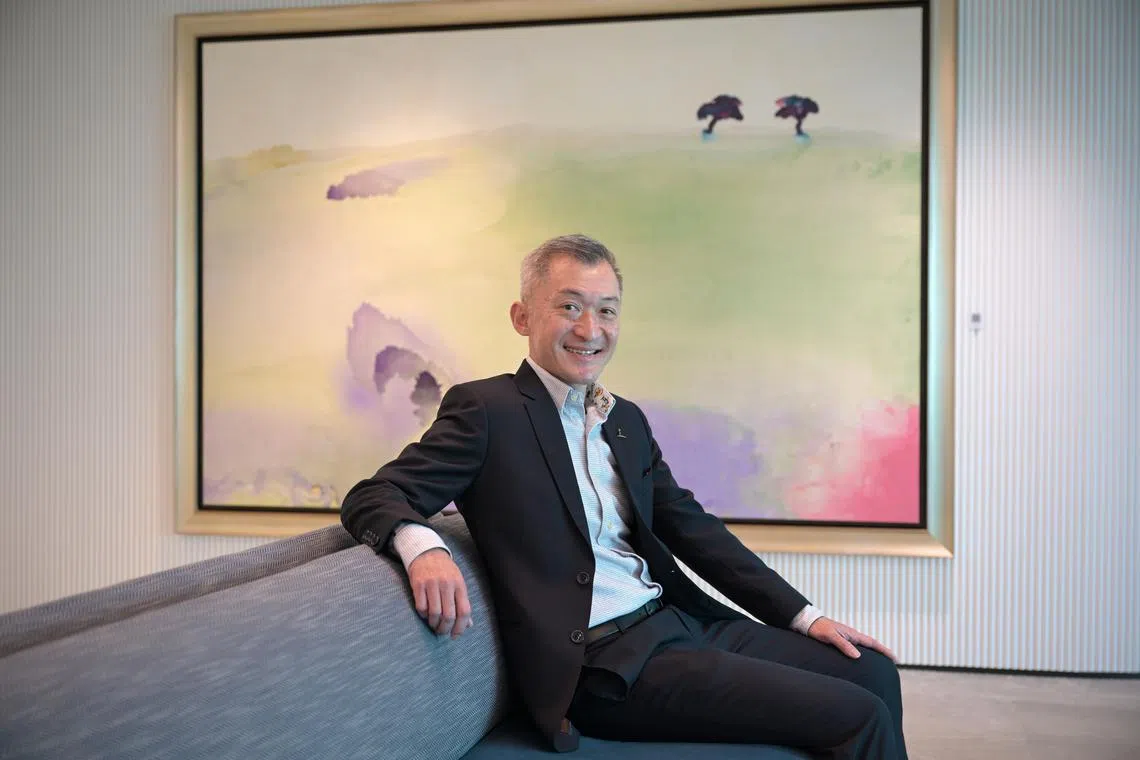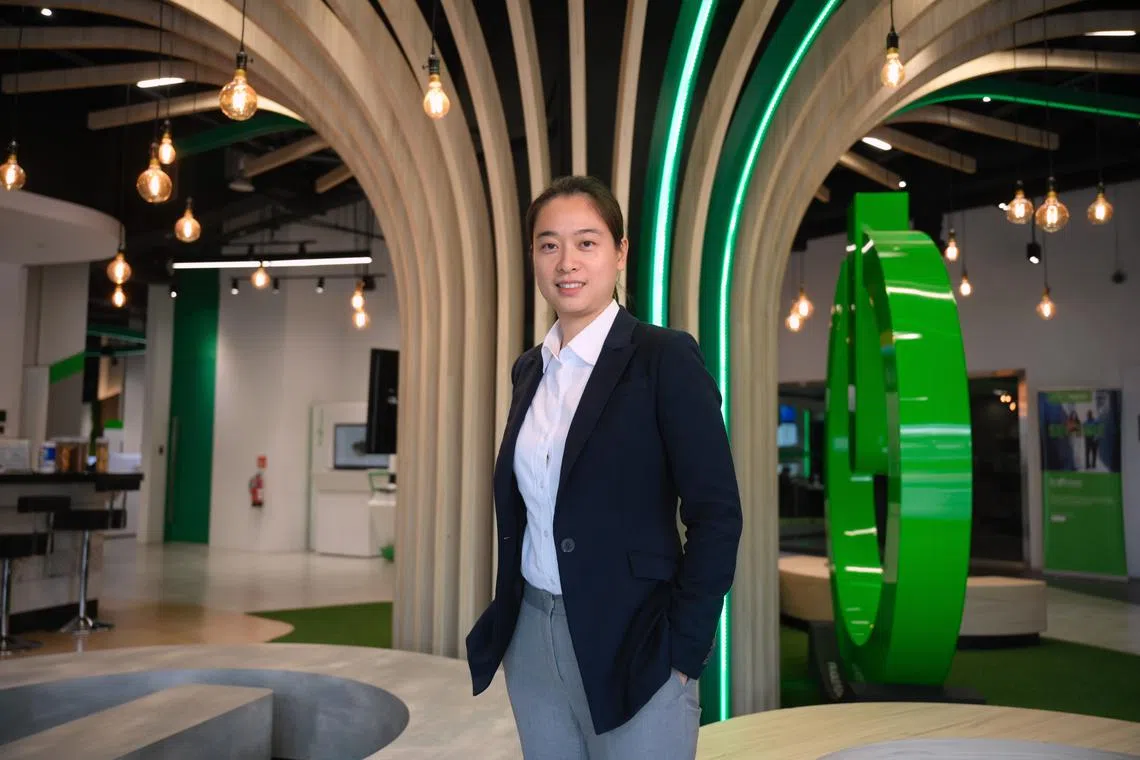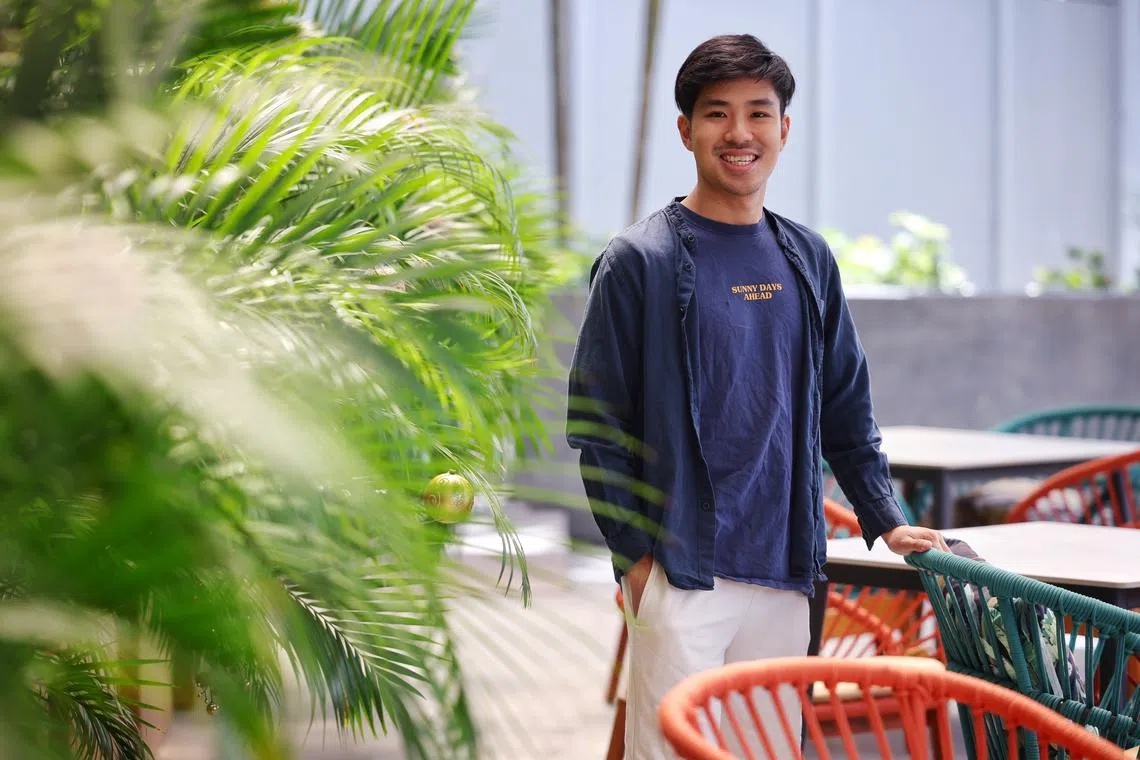All abroad: Why some S’poreans take the overseas leap, and others don’t
Sign up now: Get tips on how to grow your career and money

(From left) CapitaLand China Trust CEO Tan Tze Wooi, Schneider Electric’s head of strategy for East Asia operations Wei Linyun and AI researcher James Chua are among those who took the overseas leap.
ST PHOTOS: NG SOR LUAN, MARK CHEONG, JASON QUAH
SINGAPORE – Openings abound for Singaporeans with the chops to work and lead across borders in the many multinational firms with global or regional hubs here, or in home-grown ones seeking to expand overseas.
The latest salvo to help workers here take on these roles was launched in November, with Workforce Singapore’s (WSG) $16 million Overseas Markets Immersion Programme (OMIP)
The programme is the latest in a set of moves to invest in local workers rolled out since the October 2023 Forward Singapore report
In the report, the fourth-generation leadership said it will encourage more Singaporeans to venture overseas as part of their career development, and will find ways to address their worries, such as how their children will adjust when the family returns home.
Such stints will be crucial if local talents want to climb the ranks in the majority foreign-owned companies registered here, which the Economic Development Board (EDB) said number 60,000 and employ some 1.2 million Singaporeans.
“With MNCs (multinational corporations) continuing to locate decision-making functions and critical activities such as manufacturing and innovation activities here, there will be more opportunities for Singaporeans to take up senior roles within these firms,” said EDB executive vice-president Alvin Tan.
Even with this push, signs point to professionals here forgoing overseas stints that may prime them for plum roles, including in Singapore.
A 2023 poll by the Boston Consulting Group and two global recruitment firms found that 64 per cent of Singaporeans were willing to work abroad.
As the Government ramps up programmes to groom the next generation of corporate leaders by way of a stint abroad, The Straits Times spoke with a dozen professionals, companies and agencies on why employees here do or do not take up overseas postings.
What emerges is a picture of great potential payoff, though family life disruption and an unfamiliar living environment are significant hurdles.
Why they went, and what they gained
It takes a village to put a Singaporean on an overseas posting, if a CapitaLand executive’s move to Beijing is any indication.
In 2007, Mr Tan Tze Wooi was 34 and married with three children, aged one to four.
He was then a senior manager at the company’s real estate investment trust focused on China’s shopping malls when he said “yes” to being based in China for a two-year stint.
It took a number of “gui ren”, or benefactors, to ensure his wife could also move to Beijing as a professional instead of as a trailing spouse, which would have put a dent in their finances and her future prospects.
“It worked out in a way, as the people who were helming the China piece of business used to be people in Singapore whom we knew.
“Referrals here and there gave her the chance to transfer herself there,” he said.

Mr Tan Tze Wooi ended up staying in China for nine years instead of two, and rose up the ranks to become chief executive of CapitaLand China Trust by 2017.
ST PHOTO: NG SOR LUAN
The move also threw into question the hours the couple had put in as parent volunteers to secure a spot at a popular primary school for their eldest child.
What reassured Mr Tan was the Ministry of Education’s (MOE) Leave of Absence (LOA) scheme, which allows children who accompany their parents on an overseas posting to remain registered students of a school, so they can be readmitted smoothly on their return.
According to the ministry’s website, the nominal annual fee to retain the LOA is at least $39 for primary schools, $60 for secondary schools, and $81 for junior colleges.
An MOE spokesman said Singaporean students can apply for the Assured School Placement service, which guarantees them a place in a primary or secondary school with vacancies as near to their home as possible, even before their return to Singapore.
There is also the School Placement Exercise for Returning Singaporeans for students who want to join a secondary school, junior college or Millennia Institute at the start of the following academic year.
Over the past three years, an annual average of approximately 1,100 returning Singaporeans approached MOE for assistance through the two schemes. All who applied have been offered a school place, said the spokesman.
As it turned out, Mr Tan would stay in China for nine years instead of two, and rise up the ranks to become chief executive of CapitaLand China Trust (CLCT) by 2017, the year he returned to Singapore.
That being in China was career-defining is an understatement – he is set to become group chief risk officer of CLCT’s sponsor, CapitaLand Investment, from Jan 1, 2025.
Looking back, he said it would have been untenable for him to have tried to do his job from Singapore – the need for face-to-face interactions was why his own boss moved to Beijing after CLCT’s listing on the Singapore Exchange in December 2006.
“What I realised very quickly was that our Chinese counterparts don’t look at e-mail at all,” Mr Tan said. “Their working style and approach are such that everything is based on face time or phone, so it was very hard for me to monitor a lot of things and to interact remotely.”
The initial part of his China stint coincided with the global financial crisis, which accelerated his learning. Many deals had to be frozen or canned because of the crisis, and he had to deliver bad news while finding a way to keep relations warm.
Faced with disgruntled counterparts, some of whom threatened to sue, he worked to defray situations with teammates he considers friends today.
“You need to be in the same trench: That’s when trust is built, that’s when you overcome challenges together, day and night, sweating in the same office,” he said. “It’s very different from you just saying ‘hi’ and ‘bye’ over Zoom.”
Operating in China also sensitised him to its more hierarchical business culture, and taught him how to “pull the levers” to better deal with a range of people or situations.
What makes people tick in different parts of China is very different from in Singapore, where “the range of views from Pasir Ris to Jurong is only this much”, he added.
This need for wider experience helps explain the Government’s push to get more Singaporeans overseas.
A Ministry of Manpower (MOM) spokesman contacted by ST cited a recent survey, which highlighted the lack of exposure in overseas markets and global or regional operations as a major concern for director-level recruitment within the local workforce.
In an annual survey of member companies by the American Chamber of Commerce here, more than 40 per cent of respondents said this was the second-biggest obstacle to hiring more Singaporeans and permanent residents for senior-level roles, just below a lack of necessary specialised skills.
Anecdotal feedback from companies here also suggests a need for more Singaporeans to take on overseas stints at an early stage of their career, so there is a pipeline of workers ready for leadership positions later on, said the MOM spokesman.
Ms Wei Linyun, 34, Schneider Electric’s head of strategy for its East Asia operations, said she put her hand up for a two-year posting to Sydney in the middle of the Covid-19 pandemic in 2021, as she was “getting a bit comfortable with the Asian-majority set-up”.

Schneider Electric’s head of strategy for East Asia operations Wei Linyun said her Australia experience opened her eyes to tapping Singapore’s strength as a cosmopolitan hub hosting many regional teams.
ST PHOTO: MARK CHEONG
In Australia, Ms Wei became employee No. 1 in a start-up effort within the French MNC to create a new business model in building management. In 2023, she earned a title bump to vice-president.
Her detour to learn new dimensions of the business helped in her current regional role, which she took up in August.
She said her Australia experience made her realise that she could lean more heavily into Singapore’s strength as a cosmopolitan hub hosting many regional teams.
This could translate to her assembling a virtual, global team from here to solve a problem that requires expertise from across the organisation, she pointed out.
Stints abroad are not the sole preserve of those working in MNCs.
Ms Geraldina Koh, 34, took the leap to join solar power equipment integrator Eigen Energy as general manager of Thailand almost three years ago, after six years with Sembcorp Industries in various roles.
She was tasked by Eigen’s founder Kevin Sim to set up the green tech start-up’s Thai business, which now comprises five people, including herself.
Ms Koh said she took up the role for the exponential learning curve of launching an entirely new business from scratch relatively early on in her career, but acknowledged that the move would not be suitable for everyone, especially as she took a pay cut despite competing offers.
Programmes like OMIP are set to avail overseas stints to more Singaporeans, and the early take-up rate is encouraging. WSG said that since its launch in November, at least 15 firms have applied to participate in the scheme.
They include Swiss healthcare manufacturing giant Lonza, which is sending three of its Singapore-based biotechnologists to Visp, Switzerland.
At Visp, the three, aged 30, 35 and 44, will support the set-up of the MNC’s new bioconjugates suites as part of the exposure designed to prime them for leadership roles within the company.
Other national schemes with the objective of nurturing indigenous corporate leaders include the Singapore Global Executive Programme and Global Ready Talent Programme spearheaded by Enterprise Singapore, and the Monetary Authority of Singapore’s International Postings Programme for finance professionals.
Why some stay home
“Good for you, bro.”
This was the lukewarm response a financial technology professional received when he told friends about his prospective posting in 2025 to Vietnam – a growth market for the Singapore-headquartered fintech start-up where he works.
The 27-year-old, who declined to be named, will assume an operational role to break into a new market for his company.
In his view, many of his peers are too comfortably strapped down by their “golden handcuffs”, be it a condominium unit or fancy car.
“Once you earn a certain amount coming out of school, the mentality in this place is ‘I need to buy a condo’, ‘buy a car’, and it gets stuck in this cycle in which you cannot really move anywhere,” he said.
The high personal stakes involved mean “the risk-reward to my career path doesn’t make sense to them”, he said.
Sovereign wealth fund GIC’s head of real estate for Korea Jasmine Loo also sees the comfortable life in Singapore as a factor holding some back.
“It’s always a pull and a push. So if there is not really a very strong push – Singapore is a very comfortable living environment where it is comfortable to raise a family – the pull has to be a lot stronger,” she said.
While a new market comes with an opportunity to prove oneself, it also comes with risks, said Ms Loo, 37, who has been on overseas postings since 2016, including three years in Shanghai and five years in London.
“People may be hesitant to move because if you’re already doing well in Singapore, why rock the boat, go overseas and work with a new team?” she asked.
In some ways, an overseas posting is a career move comparable to changing employers, she noted.
“When you move to another company, you need to re-establish yourself. Likewise, in a posting, you need to re-establish yourself in a new office, except that if you survive it, you learn a lot,” she said.
Someone who has seen both sides of the coin and chosen to return to Singapore is artificial intelligence researcher James Chua, 28.

Artificial intelligence researcher James Chua has seen both sides of the coin and has chosen to return to Singapore.
ST PHOTO: JASON QUAH
He worked for a software start-up and a research organisation in the US for much of the past three years after graduating from the National University of Singapore in 2021.
While working at the cutting edge there was fulfilling and paid well, he found himself wishing he could be with his family and girlfriend back home.
He now works for another research group, in an arrangement that lets him spend about a quarter of his time in Berkeley, California, and the rest working remotely in Singapore.
Mr Chua noted that this choice has had real consequences for his career progression, as he has much fewer opportunities to build ties with largely US-based industry peers who can provide the personal references necessary for job offers in his line of work.
He also took a pay cut of around 20 per cent from what he would have earned if he had worked wholly in the US, but he maintains that it is the right decision.
“There are other things that matter to me outside my career,” he said. “My family is here, there’s a real sense of safety where you don’t need to worry about being out at night, and the food is also better.”
Ms Kia Holm Reimer, who consults on expatriate issues, noted that norms surrounding early home ownership, with a minimum occupation period in the case of Housing Board flats, and caregiving may also prevent Singaporeans from spreading their wings.
“There is a stigma here around leaving your parents behind,” said the Dane, who has lived in Singapore with her husband and two children since December 2021.
In contrast, in her home country, it is more typical for parents and adult children to have eventful, fulfilling lives independently and far apart while keeping a fond relationship, she added.
And not all dual-income couples may be as fortunate as CapitaLand’s Mr Tan and his wife, as many countries do not have an easy route for spouses or dependants to hold a job, unless each receives a work visa in his or her own right.
Should one spouse take up a posting, the other would have to put their career on hold or stay put at home, which can breed unhappiness, said Ms Reimer.
Some employers also may not have work that adequately recognises and uses skills picked up by their returning expatriate workers, Ms Reimer added.
Companies like management consultancy Kearney told ST that they have made moves to unlock career growth and leadership development for workers who turn down overseas posting opportunities due to family commitments. Such workers include new parents, newly-weds or those caring for elderly parents.
Among the development opportunities are flexible arrangements, mentorship from experienced colleagues and tailored opportunities like short-term assignments, said Mr Nithin Chandra, Kearney’s South-East Asia managing partner.
Around four in 10 Singaporeans working for the firm here have worked on projects overseas in 2024, he noted.
At DHL Express Singapore, the policy is that all employees are given opportunities to succeed, regardless of their overseas experience.
While experience in multiple countries can be advantageous for global or regional roles, this is not mandatory for country-specific roles, said the company’s managing director Christopher Ong.
“Nevertheless, the DHL Express regional office is also based in Singapore, so DHL employees based locally in Singapore can move into regional roles at DHL without relocating abroad,” he said.
Two of the 10 people making up DHL Express’ global management board are Singaporean, which Mr Ong said shows how Singaporean professionals punch above their weight in the global DHL network.
That Singaporeans must – and do – hold their own in the global competition for top talent was a point Prime Minister Lawrence Wong made in a Dec 19 podcast interview.
“The top jobs in some of these big, multinational enterprises are jobs where the companies and employees will choose on merit – it has to be. We cannot force them to choose only Singaporeans, that would not be the right thing to do,” he said.
He noted that many Singaporeans are today holding senior roles, such as that of regional CEO, in sectors like banking.
“It shows that the Singaporean leadership is rising on their own merit, through their own abilities and capabilities and not because we force a quota,” said PM Wong.
“That’s the outcome we truly would like to see, that we Singaporeans can command the premium jobs.”
Wong Pei Ting is a correspondent at The Straits Times. She covers politics and social affairs.
Tay Hong Yi is a correspondent who covers manpower and careers issues, with occasional forays into fintech, trade and corporates.


